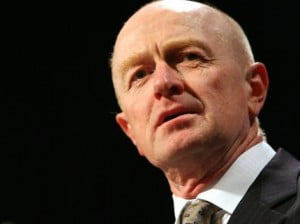
The governor of the Reserve Bank of Australia, Glenn Stevens, now considers central banks should be more proactive in dealing with dangerous asset bubbles.
I made the same suggestion to the previous governor, Ian Macfarlane in “The Coming Kondratieff Crash” in 2001, but Mr Macfarlane sought to place the blame for the financial threat well and truly outside his own backyard, saying in a talk to the Economic Society on 10 July 2001: “The major threat to our future growth prospects now comes from the international economy, not from domestic factors.”
Mr Macfarlane and others will undoubtedly claim that the GFC did indeed emanate from overseas, but this would be to ignore the case made by my colleague Dr Gavin Putland that data show recessions usually begin at home.
Glenn Stevens’ statement does merit a hearing from our policy makers: but it won’t get it. It never does. Nor would ratcheting up interest rates be the most appropriate policy.

Stevens’ earnestness reminds me of a statement made by Don Mercer when he took over as CEO of the ANZ Bank from Will Bailey in 1992. Surveying the rubble surrounding him following the bursting of the 1989 real estate bubble, Mercer bravely declared that we had learned lessons from the ensuing recession that would see to it that such crashes would never occur again.
Maybe Australia’s recession hasn’t happened yet, Don, but it is only a matter of time. Whilst messrs Rudd and Swan congratulate themselves for having forestalled an Australian financial collapse by means of their stimulus package, they might contemplate the possibility that their action was premature, because our real estate bubble hadn’t even burst, and that, in fact, their pre-emptory action acted to re-stimulate Australia’s incredible property bubble.
It’s implicit in Glenn Stevens’ statement that he believes early action on interest rates might choke off future bubbles. It could help a little, Glenn, but didn’t you notice that property bubbles also developed during the high interest rate regimes of the 1970s and 1980s?
No, I’m afraid the ONLY way to put an end to property bubbles, Glenn, is for policymakers and our elected representatives to ensure that a man’s home (or, more properly, his block of land) is no longer his tax haven. That is, tax policy should encourage industry and destroy real estate speculation, not vice versa.